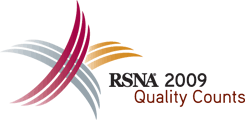
Abstract Archives of the RSNA, 2009
Phillip Matthew Young MD, Presenter: Nothing to Disclose
Robert J. Herfkens MD, Abstract Co-Author: Nothing to Disclose
Bruce L. Daniel MD, Abstract Co-Author: Nothing to Disclose
Gadoxetate disodium, an MR contrast agent with active liver uptake and excretion, is now approved for liver imaging in the United States. Because optimal hepatocyte phase imaging occurs 10-20 minutes after contrast injection, T2 weighted images are typically obtained after dynamic contrast enhanced images but before the hepatocyte phase to shorten the scan time.
Although previous work has shown that T2 image contrast is not significantly altered after gadolinium administration for liver imaging, it is unclear if increased concentrations of gadolinium in the liver and biliary tree with gadoxetate could alter T2 contrast more than conventional gadolinium agents.
We sought to assess whether T2 image contrast is affected by administration of gadoxetate disodium.
25 clinical patients were imaged on a 1.5T scanner. Our protocol included precontrast respiratory triggered T2 FRFSE fatsat and pre-contrast LAVA sequences. Gadoxetate disodium was administered IV at 0.1cc/kg, and dynamic contrast enhanced LAVA sequences were obtained up to 4 minutes after injection. The precontrast T2 weighted sequence was then repeated.
Subsequently, images were reviewed on a workstation. Identical ROIs were drawn on pre-and post-contrast T2 images on 3 different segments of the liver, 3 different areas of the spleen, 3 different background areas, and a single ROI was placed on the CBD. The 3 signal intensity values for liver, spleen, and background on each scan were averaged. Liver/spleen, liver/background, and liver/CBD SI ratios were calculated. Bland-Altman plots were generated and concordance values were calculated for pre-and post contrast liver/spleen, liver/background, and liver/CBD ratios.
Concordance values were: Liver/Background 0.761 (95% CI 0.475-0.901), Liver/Spleen 0.960 (95% CI 0.904-0.984), and Liver/CBD 0.850 (95% CI 0.640-0.972). These values were all statistically significant (p<.001).
Our results indicate that SI ratios of liver and spleen, liver and background, and liver and CBD are unchanged 4 minutes after gadoxetate injection. This supports the practice of obtaining T2 weighted images after dynamic contrast enhanced images but before hepatocyte phase imaging to shorten scan time using gadoxetate for liver imaging.
T2 weighted images may be obtained after dynamic contrast-enhanced imaging with gadoextate without significantly altering image contrast.
Young, P,
Herfkens, R,
Daniel, B,
T2-weighted Image Contrast Is Not Affected by Hepatocellular Uptake of Gadoxetate Disodium in the Parencymal Phase. Radiological Society of North America 2009 Scientific Assembly and Annual Meeting, November 29 - December 4, 2009 ,Chicago IL.
http://archive.rsna.org/2009/8005890.html

